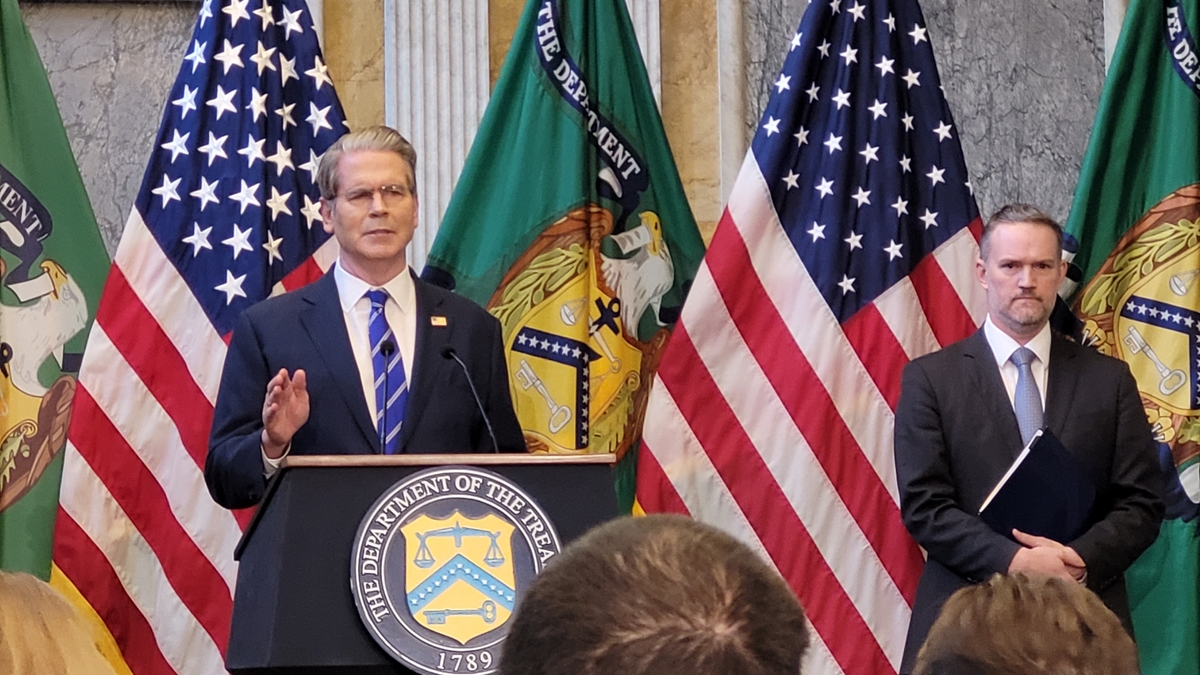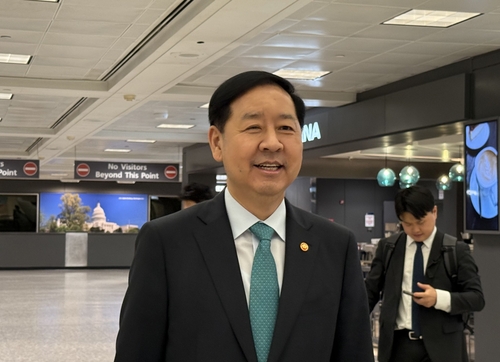
(Washington = Yonhap News) Correspondents Hong Jeong-gyu, Lee Yu-mi, and Kim Dong-hyun = A final agreement in the Korea-U.S. trade negotiations following U.S. President Donald Trump's"tariff war" appears to be within sight.
As there are signs that the two sides' differences regarding the composition and method of investment in the U.S. and foreign exchange market safety measures, such as the Korea-U.S. currency swap, appear to be narrowing to some extent, expectations are growing that an agreement will be reached in the near future.
At a press conference held at the Treasury Department in Washington, D.C. on the 15th (local time), U.S. Treasury Secretary Scott Besant answered a question from a Yonhap News correspondent asking,"Do you expect that differences in opinion regarding South Korea's commitment to investment in the U.S. will be resolved?" by saying,"I am confident that the differences can be resolved."
"We are currently in talks, and I anticipate something within the next 10 days," said Secretary Besant."Something" is interpreted as referring to the outcome of the US-South Korea trade negotiations.
In a previous interview with CNBC, when asked which trade negotiations he is most focused on, Secretary Besant said,"We are about to finish up with Korea."
When asked if there were any differences of opinion regarding Korea's investment in the U.S., he replied,"The devil is in the details, but we are ironing out the details."
Although Secretary Besant did not disclose the specifics of the "details," it is interpreted to mean that the two sides are reaching an agreement on specific issues, such as the composition and method of the $350 billion investment package in the U.S., which has been a major point of contention between the two countries, and foreign exchange market safeguards for the large-scale procurement of dollars.
Deputy Prime Minister and Minister of Strategy and Finance Koo Yoon-chul met with reporters upon entering the country through Dulles International Airport near Washington, D.C., and said,"The two sides are continuing to coordinate at a rapid pace."
In the tariff negotiations concluded on July 30, South Korea and the United States agreed to lower the reciprocal tariff on South Korea from 25% to 15% as previously announced by the United States and for South Korea to make a total of $350 billion in investments in the United States. However, they have shown differences of opinion over the implementation method of the investments in the United States.
South Korea's plan was to make about 5% of the $350 billion in equity investments directly in cash, with most of the remaining portion in the form of credit guarantees without direct cash transfers, and the remainder in loans. However, the United States demanded a"blank check for investment," as in the previous agreement with Japan.
Afterwards, the Korean government demanded ▲ the conclusion of an unlimited Korea-U.S. currency swap ▲ a reasonable level of direct investment ▲ guaranteeing the right to participate in the selection of investment destinations based on ‘commercial rationality.’
Ultimately, if, as Minister Besant mentioned, differences in detail have been narrowed and the negotiations have entered the final stage, it is possible to speculate that a conclusion to the follow-up negotiations that have continued for two and a half months is imminent.
The former vice prime minister said he was continuing discussions with the United States about putting together a $350 billion investment package, adding that he had spoken to Treasury Secretary Besant and Commerce Secretary Howard Rutnick and they understood.
Both sides also made positive comments on the need to establish foreign exchange market safety measures to prevent a foreign exchange crisis in Korea in the event of Korea's large-scale investment in the United States.
When asked by a Yonhap News correspondent about the possibility of a currency swap agreement between South Korea and the U.S., Secretary Besant said,"The Treasury Department does not provide currency swaps; that is the responsibility of the Federal Reserve." He added,"I am not the Fed chairman, but if I were, South Korea would already have a currency swap agreement like Singapore."
Former Deputy Prime Minister Koo also predicted,"The United States has a great understanding of our foreign exchange market," adding,"Therefore, they will likely accept what we have proposed."
However, the currency swap between the U.S. and Singapore mentioned by Secretary Besant is different from the unlimited currency swap that Korea initially hoped for in that it is worth $60 billion.
Accordingly, attention is focused on the possibility that the two countries will agree on a currency swap of a certain size or a foreign exchange market safety device that can have a similar effect.
Meanwhile, Kim Yong-beom, the chief of staff for policy at the Blue House, and Kim Jeong-gwan, the Minister of Trade, Industry and Energy, who are leading these negotiations, are scheduled to visit Washington, D.C. on the 16th to meet with Secretary of Commerce Rutnick, the key figure on the U.S. side.
Yeo Han-goo, head of the Trade Negotiation Headquarters, plans to enter the United States today and meet with U.S. Trade Representative Jamieson Greer.
Deputy Prime Minister Koo is also expected to meet with Minister Besant and provide support during his visit to Washington, D.C. today to attend the G20 Finance Ministers and Central Bank Governors Meeting and the International Monetary Fund (IMF) and World Bank (WB) Annual Meetings.
Considering Secretary Besant's remarks, which came amidst the full mobilization of the US economic and trade lines, it appears that the possibility of the two sides reaching a final agreement for signing an investment memorandum of understanding (MOU) has increased during or around the Korea-US summit scheduled for the Asia-Pacific Economic Cooperation (APEC) summit at the end of this month.
In fact, Minister Kim met with Secretary Rutnick in New York on the 11th of last month and the 4th of this month and presented a"revised proposal" to the U.S. side that included an unlimited currency swap, and Secretary Rutnick is also known to have expressed some sympathy with Korea's concerns about foreign exchange market instability.
Foreign Minister Cho Hyun also stated at the National Assembly on the 13th,"The United States has now presented a new alternative. We are currently reviewing it."


